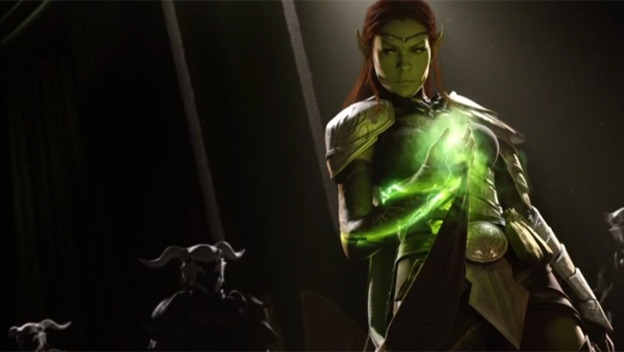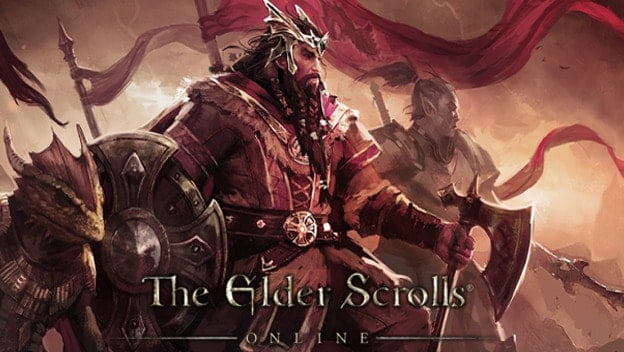Next-gen systems seem determined to usher in the age of console MMOs, with games like Destiny and The Division at the forefront. Of course, the biggest (or at least most well-known) name in upcoming MMORPGs is the Elder Scrolls Online, the long-awaited online installment in the Elder Scrolls franchise. As such, ESO was initially met with an overwhelmingly positive reception; the concept of “a Skyrim MMO” was finally a reality, at least to some degree. After spending some hands-on time with the game at Bethesda’s Pre-E3 Conference (which yielded this handy-dandy preview , by the way), I can confidently say that the excitement is warranted; The Elder Scrolls Online is shaping up to be a fantastic game on all platforms.
Incidentally, that last part is where things get a bit muddied. ESO was originally slated for a PC-only release, but E3 2013 brought the news that the game will be available on PS4 and Xbox One as well. It also became known that the initial Q4, 2013 release date had been pushed back to “Spring 2014,” presumably as padding for the newly announced versions of the game. The announcement was incredibly abrupt, and, unsurprisingly, many fans and followers were suddenly out in droves, hell-bent on proving the inadequacy of next-gen systems in comically witch-trial fashion.
Laughably, the majority of dissatisfaction is rooted in simple PC elitism, a common enough issue in today’s gaming industry, or sheer ignorance—though the line between those two is blurred, if there at all. There are several glaring fallacies in this way of thinking that, having sat down with members of the development team and played the game myself, I fully intend to highlight. However, let’s first take a look at what actual ESO “fans” had to say in response to the official Facebook announcement (always a reliable breeding ground for coherent, intelligent statements) of the game’s multiplatform status.
“[Explicative]. Why would anyone think an MMO is a good idea on a console?”
It probably has something to do with the immense consumer base which has shown a profound fondness for open-world titles. Oh, and the advanced networking capabilities of next-gen systems may have played a part. Remember that whole Cloud thing?
“Just what we all dreaded. The dumbing down and simplifying of Elder Scrolls even more.”
You do realize that the most successful Elder Scrolls releases, Oblivion and Skyrim, were both available on consoles, right? Not only that, but last I checked, there’s no intricacy quota between systems; console games are in no way innately inferior or less complex than PC games. Maybe if I jammed a GeForce GTX 680 VGA into a PS3, you’d suddenly change your mind? Or should I liquid cool my PS2 memory card to make consoles more reputable?
“I hate the ignorance of console gamers trying to compare a console to a PC by the time the release the new console it will be outdated and will remain that way steadily holding back any real advances in the game.”
Alright, that was almost a sentence. Good effort. Personally, I agree to some extent; I, too, hate the inherent flaws of comparing PCs and consoles, as the two are radically different platforms. However, the pseudo-assumption that consoles are wholly stagnant, while entirely accurate from a strictly hardware standpoint, doesn’t hold water.
“It’s going to be for ps4, pc, and Xbox one. It’s going to be great that the franchise is making it so u can play with multiple people at once. More realistic, more adventure more fun. Stop hating until it actually comes out an we see how great or not great it is. From someone that has played all the elder scrolls I’m very excited to see how this game will be after skyrim being such a badass game. [Explicative] Xbox one. And [explicative] the haters!”
I’m at no shortage of emphatic comments, but I’ll assume you get the point: Many ESO fans are pissed. Oddly enough, they don’t seem to know exactly why.
The most prominent complaint from the PC player base is that, due to the addition of Xbox One and PS4 versions to the game, The Elder Scrolls Online will somehow be dumbed down. Among other things, this connotes lowered graphical quality, a botched server system, and limited content updates. Coincidentally, every last one of these is easily discredited.
So let’s go down the list.
Lowered Graphical Quality?
It’s no secret that ESO is going to be pretty. As I’ve said before, we’re talking unabashedly Guild Wars 2-destroying visual fidelity, here. With that said, I can understand the apprehension at being somehow robbed of pixel candy due to gaps in hardware capability, namely those seen between gaming consoles and gaming PCs. However, as the multitude of trailers and gameplay demos seen at E3 have shown, the PS4 and Xbox One aren’t curled up in a 16-bit corner with their tails between their legs. Both systems are sporting advanced AMD-centric x86 infrastructures and have made considerable strides in raw processing power.
As detailed by Mark Cerny, the PS4’s lead architect, Sony’s next-gen system, in particular, has seen several innovations in the way graphical computations are handled. The addition of a third GPU bus, an enhanced L2 cache, and the independently-addressable 8GB pool of GDDR5 RAM will greatly augment the system’s abilities. Beyond what’s under the hood, both the PS4 and Xbox One will capitalize on Cloud computing , an externally accessible means of offloading in-game computations which alleviates the stress of a game, and, consequently, allows developers to create bolder environments and the like.
Sloppy Servers?
Admittedly, I can’t speak to potential interactions between multiple versions of ESO, simply because the necessary details haven’t been fully disclosed. What I can do, however, is lay to rest concerns of improper server maintenance on any given platform. As Elder Scrolls Online gameplay designer Maria Aliprando told me, ESO is based around what’s known as Megaserver tech. Rather than designate cut-and-dry servers, as seen in comparable MMOs such as World of Warcraft or Guild Wars 2, ESO allocates players according to their position in the game. Likeminded players are grouped up based on the decisions they’ve made in the story, their demographic and geographic relation, and through social-networking integration. This represents a uniquely tailored system of MMORPG gameplay that eliminates tedium and engenders player-to-player interaction.
However, that alone didn’t satisfy my curiosity at the time, so I inquired about interaction between two friends who wanted to play together but had made radically different plot choices. In response, Aliprando explained that, for example, if two players ended up with opposing circumstances mid-quest, the two would still be able to cooperate. It’s as simple as hunting the same item or speaking to the same NPC but simultaneously seeing a different world. On a similar note, she was able to confirm the existence of single-player only servers which would allow diehard Elder Scrolls fans who’d developed an “I am the God of this world” mentality from Skyrim and the like to retain their independence. This relaxed my tentative pessimism , and once again reminds players that server maintenance will not be an issue for ESO, multi-plat or no.

What about content delivery? HUH!?
Somewhere along the line, the rumor that consoles never change worked its way up to factual status. As previously stated, this is perfectly accurate when applied only to the hardware side of things. Unlike PCs, gaming consoles aren’t upgradeable nor do they physically evolve, and they are therefore stagnant. However, this alone doesn’t prove the stationary doom of systems.
As a system ages, developers become more familiar with its architecture and are able to make greater leaps in development. This is obvious in the enormous gaps between early and current PS3 and Xbox 360 releases, and is also applicable to next-gen development. Better still, as developer testimony defends, the x86 architecture of the PS4 and Xbox One is much more developer friendly and will allow for refinement straight out of the gate. Moreover, even when compared to PC networks and distribution avenues, there’s nothing holding systems back in how ESO will be updated.
And all of this is to say nothing of what is quite arguably the most important factor in ESO going cross-platform: PC gamers are the minority in the Elder Scrolls franchise. As StatisticBrain reports , figures taken directly from Steam and Bethesda show that roughly 14% of sales from Skyrim came from PC owners. Let me say that again: 14%. One. Four.
Less than one-fifth of ESO’s implied player base—fans of the most recent Elder Scrolls release—comes from the PC side of things, so it’s only logical for Zenimax Online and Bethesda to not want to exclude the biggest portion of their target audience. Clearly, MMO fans have to be accounted for and will inarguably distort that figure, but the fact remains that PC gamers have less of a claim to ESO than console fans. Earlier iterations (you know, Morrowind and beyond) are irrelevant for this purpose as the most recent figures clearly demonstrate that console gamers hold the majority stake.
If that’s still not enough for you, consider the following: Kingdoms of Amalur: Reckoning proves that MMO-inspired controls can fit perfectly on a controller; an ESO subscription fee has neither been confirmed nor denied, so we can only speculate; and the quarterly delay of ESO’s release will only lead to an improved final product. So, I’ll go ahead and ask it: What the hell are PC elitists going on about?
